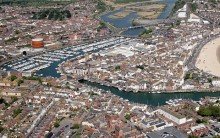Over the last seven days there has been much discussion regarding the accuracy of an Observer article that detailed some of the problems faced by seaside towns and Weymouth in particular. The newspaper’s narrative referring to culture and economics was largely disparaging with terms such as wasteland; isolation; poverty; deprivation…. The focus of the interviews was on low pay; lower quality education; poor public transport; dependency on volunteers; unsatisfactory digital communication; austerity; financial squeeze; addiction; feudal communities; duplication of services; teenage pregnancy…. A reader could be mistaken in their belief that ‘Old Nick’ was sitting impatiently below the town waiting to rip the Jurassic rocks asunder to allow its inhabitants to be embraced by their rightful destiny. That may well be the case but the task I set myself over the last week was not to dig deep into the limestone and chalk… but to explore the responses and the local area of this ‘Georgian town’.
I decided to adopt a devil’s advocate position wherever possible and to venture in to parts of the town I had only previously glimpsed at. Using face to face; social media and my middle aged legs I was going to stop, look and listen. With all this good intention everything fell apart. This article was in The Observer. How many people had actually read it? I don’t mean heard about it; scanned the title and its opening sentence; chatted about whilst dribbling over The Sun; responded to a facebook post… I mean actually read it. What was the point I asked myself in trawling through local responses if most were responding to a mutation passed on by others who themselves had responded to a mutation…? Absolutely none? Or was it worth the effort to find out what local people thought about their town and to use the article merely as a catalyst? As it turned out it became a hybrid. Too many were responding to the article with ‘it made me spit…’ or ‘it tells it how it is’. Some offered evidence in support of their case others did not. Some were obsessive about the cultural aspects others the economic. From Weymouth having a thriving artistic and musical scene to it providing next to nothing for young people the extremes of opinion are represented. The dependency upon tourism and part time contracts was a repeated concern as was the inability of local councillors to properly represent the local people. Comparisons with other towns were common with Bridport regularly mentioned.
The lists of the positives and negatives streamed a forth and examples of local people making up for the vacuum left by so called democratic representatives was also common. Teachers who had complained to The Observer about its coverage and others who shrugged and suggested that they agreed with the original criticism. Local journalists ventured to have their say as if the issue wasn’t cloudy enough already. One harped on about ‘many choosing to flock to the bright – or at least brighter – lights of neighbouring cities’. Salisbury, Exeter, Southampton and Winchester? I doubt they are the magnet suggested. Maybe Bristol and London but they are hardly neighbouring. The same journalist suggested that cruise liners, their lucrative tourists and a sea life tower were our current physical hope. Throbbing heart she concluded. The required multiple by pass was though ignored.
Strolling through the different parts of the town with my eyes and ears fixed on what it offered I saw plenty of cafes; hotels; bars, restaurants; shops (although too many reduced to selling houses; junk food and financial advice); beautiful scenery at all compass points; friendly people; car parks; amusements; cycle lanes; wildlife reserves; a train station; history; fishing boats (and other kinds); beach chalets; a public swimming pool; open spaces; sports centres; a wishing well; a chalk white horse (heading out); schools; churches; caravan parks; walkers; runners; cars, buses; scooters…. The urban, rural and coastal landscape of a relatively small town. Would I want to live here? Yes? Would I want to live elsewhere? Yes? When I was a child and my family and I would go on holiday I would rejoice, on return, as we hit the top of Ridgeway Hill and saw the lights of Weymouth open up before me. When I was at university I still felt the same. It probably explains why excursions away have always been temporary. But now I am older and have learnt to engage with reality differently I also see the desperation. Walking around, almost on my doorstep, I saw struggle and people attempting to make the best of it. Leading lives they would not have chosen as a child but are now having to impose on their own. Welfare dependence; food banks; charity; insecure work; alcohol; cannabis (and the rest); debt; violence; premature death…. Along with much else it is all there and takes very little time to find. Every town has it. But so what? This is Weymouth and other towns can look after themselves. Right?
After a week of reading, chatting and contemplating I am not really any closer to whether Weymouth (and other coastal towns) is experiencing idiosyncratic strife. There are some great things locally but there are also things we should be ashamed of. Unless we accept that we are all responsible for creating the substance behind the veneer then The Observer and other newspapers will be back soon enough and the narrative will not have changed.
Douglas James







